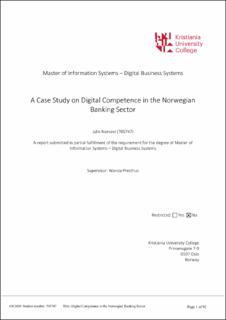A Case Study on Digital Competence in the Norwegian Banking Sector
Master thesis
Permanent lenke
https://hdl.handle.net/11250/2731638Utgivelsesdato
2020-06-08Metadata
Vis full innførselSamlinger
Sammendrag
Innovation starts with people, making humans an integral part of an organizations growth and development. While this 21st-century is crowded with disruptive technologies and ground-breaking innovations, this master thesis will take a step back and consider the main building block that is fundamental across new discoveries: basic digital competence. The purpose of this master thesis is to explore digital competence in the Norwegian Banking Sector, and the underlying factors that determine the level of competence amongst employees. This will be discovered through a single case study where data is derived from iterative testing of 213 employees in the banking sector provided by Norsk Test, as well as semi-structured interviews with tested employees and research participants. The thesis draws on the concepts of information infrastructure (Hanseth and Lyytinen, 2010) and knowledge management (Davenport and Prusak, 1998) as theoretical lens for analysis.
Accurate measures of digital competence amongst employees is scarce in current literature. This study contributes to literature by addressing the research gap of digital competence amongst employees, and propose a definition of how digital competence can be defined in the Norwegian Banking Sector. The thesis follows the event where 213 employees endures from a low level, to a significantly increased level of competence. Findings proved that tasks, role, background and organizational culture influences an employees ́ level of competence, which evolves in a discussion about perceived value and relevance of underlying concepts of the topic.

